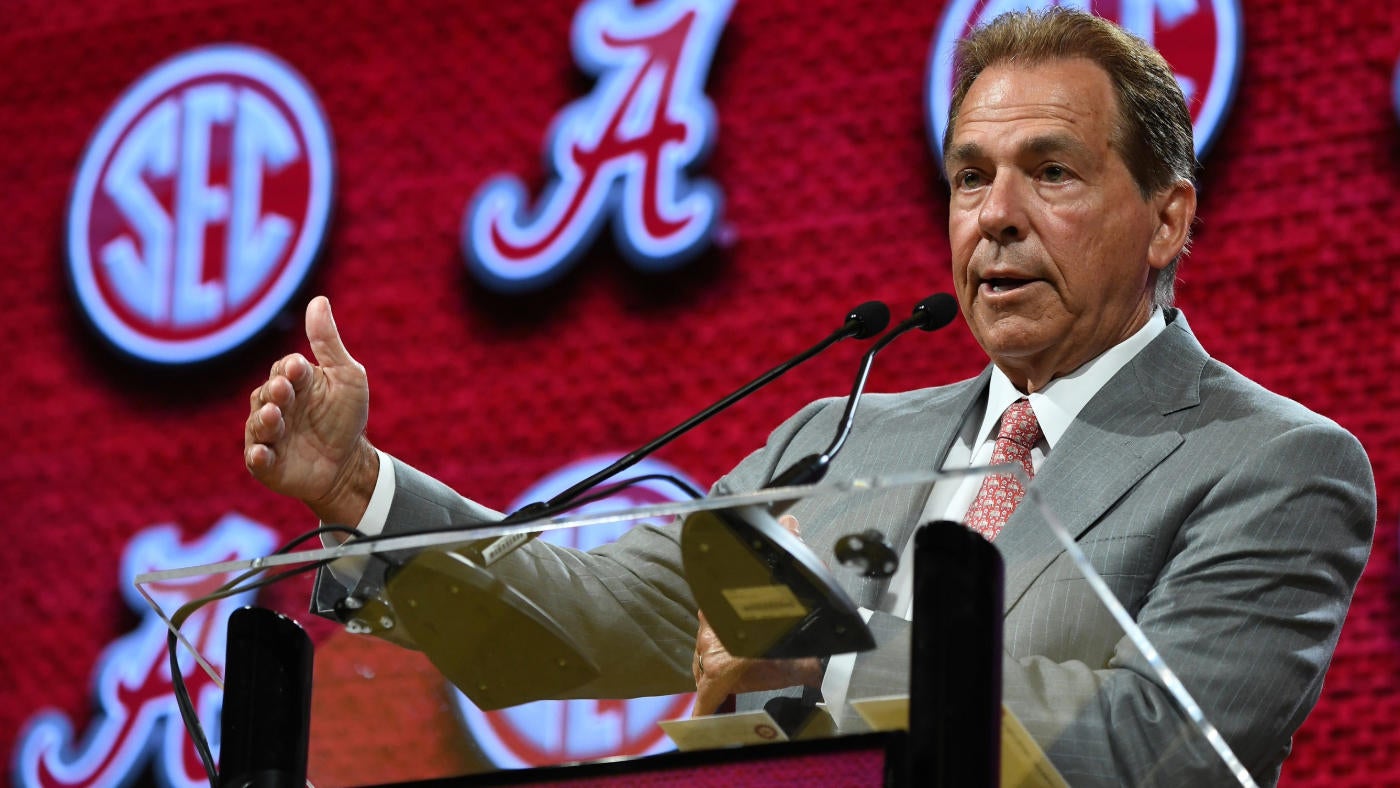
Nick Saban, wearing a red tie and blazer, made a passionate argument on ESPN around the potential consequences to leaving Alabama, a school that still pays him a half-million annually, out of this year’s 12-team College Football Playoff field.
Saban, who retired in January after 17 seasons and six national championships at Alabama, centered his argument around Alabama’s strength of schedule relative to SMU, the ACC school that earned the final at-large playoff spot over the Crimson Tide. Alabama had a better strength of record (No. 9 to SMU’s No. 15) and strength of schedule (16 to 60) than the Mustangs.
“I think one of the things I’ve mentioned throughout this football season is, if we don’t take strength of schedule into consideration, is there any benefit to scheduling really good teams in the future?” Saban said. “Here at Alabama, we’re supposed to play Notre Dame, Ohio State, Wisconsin, Florida State in the future outside the league. Those are great games for fans to see. That’s what I think we should be doing in college football is creating more good inventory for great games that people are interested in. Do you enhance people wanting to do that? What’s the athletic director going to do? He may cancel all those games now knowing that the SEC is tough enough.”
There’s a fair argument to be made that this selection committee did not value the strength of scheduling nearly as much as it should have. And Saban’s concerns around the committee disincentivizing tough non-conference scheduling are shared by some of college football’s top leaders and one reason why power players would like to see the selection process change as detailed in a CBS Sports story last week.
All of those things can be true but they really don’t apply to this year’s Alabama team. The Crimson Tide’s toughest non-conference opponent was a 5-7 Wisconsin team that lost its starting quarterback, Tyler Van Dyke, in the first quarter against the Crimson Tide. The rest of the schedule — Mercer, South Florida and Western Kentucky — isn’t exactly a murderer’s row. In fact, if Alabama had scheduled a tougher marquee non-conference opponent and won, it might have even helped its chances of making the field. SMU even scheduled more Power Four opponents (BYU and TCU) than Alabama did this season.
Even within the SEC, it wasn’t the league’s toughest opponents that tripped the Tide up. It’d be one thing if Alabama lost to only Georgia and Tennessee, two playoff teams, and was left out of the field. The reason Alabama isn’t in the field is because of losses to 6-6 Oklahoma and 6-6 Vanderbilt. The 21-point loss to the Sooners in November was especially egregious and should have all but eliminated the Tide in the moment had chaos not occurred elsewhere. If Alabama simply takes care of business against one of those two six-loss teams, it is in the playoff.
Saban argued SMU shouldn’t have been ranked as highly as it was, No. 8 overall, in the penultimate rankings headed into conference championship weekend. There’s validity to that argument, too, as the Mustangs (11-1) headed into Saturday had beat up on mostly mediocre ACC competition and didn’t have a top 25 win. The resume is very similar to Miami, a school that finished one spot behind Alabama in the final CFP rankings.
“I really think, playing in the (SEC) for over 20 years, when you have to go play Tennessee, then you gotta go play LSU, then that team that you play next, you may be more vulnerable to,” Saban explained. “And you must have a very mature, competitive team that has a lot of depth to be able to play through all these circumstances, and it’s very, very difficult.
“And to not take into consideration when you don’t beat one top 25 team. Not one top 25 team. And you went through your whole season, Indiana didn’t do that, SMU really didn’t do that. It makes a huge difference. I mean, the Pittsburgh Steelers got beat by the Cleveland Browns. We don’t sit around and say that should know (the Steelers) out of the playoffs. They still can play their way into the playoffs by beating other good teams.”
Where Saban’s argument has perhaps the greatest impact moving forward is Sunday’s final rankings kill any reason for the SEC to move to nine conference games in the future. Money had been the biggest hold up there — ESPN hadn’t been willing to kick in enough cash to make it worth the SEC’s while — but there’s no reason for SEC teams to risk more chances to lose to conference opponents when the win-loss record is what this committee valued most.
It also wouldn’t be a surprise to see the SEC only getting three teams in the field push SEC commissioner Greg Sankey to wrest more control over the process. Perhaps the Big Ten’s automatic qualifiers idea gains more steam moving forward.
But canceling all quality non-conference opponents as Saban suggested could happen would be an overreaction if Alabama and other Power Four schools followed suit. Alabama didn’t make the cut because it lost to bad teams, not because it scheduled tough.




